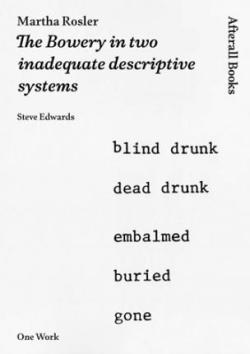Martha Rosler, The Bowery in two inadequate descriptive systems

In The Bowery in two inadequate descriptive systems (1974–75), Martha Rosler bridged the concerns of art with those of political documentary. The artwork, a series of twenty-one black-and-white photographs, twenty-four text panels and three blank panels, embraces the codes of the photo-text experiments of the period and applies them to the social reality of New York’s Lower East Side. This artwork has played a key role in debates on contemporary art and aesthetics, but it has not been the object of careful scrutiny or analysis.
In this illustrated book, Steve Edwards offers three distinct approaches to the art work. First, he engages in a work of ekphrasis - a careful description of Rosler's The Bowery. Edwards considers both the photographs and the text panels attending to the oddities and overlooked characteristics of the work. Secondly, the author contextualises the project in relation to the work of the San Diego Group, examines the prevailing view of the work as a critique of documentary photography and studies its relation to Jean-Luc Godard and other examples of political modernism. Here he also provides an overview of Rosler's career and the place within her oeuvre of The Bowery. Thirdly, he offers a speculative reading of The Bowery within the pastoral tradition. In the process, this unlikely artwork is positioned in the long tradition of western poetics.
The book makes an original contribution to the discussion of contemporary art and political aesthetics through a meticulous study of one art work and an historical reconstruction of the cultural materials from which it was constructed. This study combines careful looking, historical research and draws extensively on critical theory to provide a model for approaching artworks.